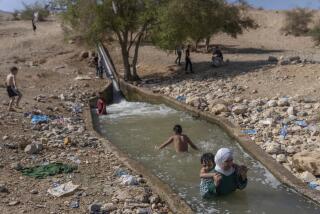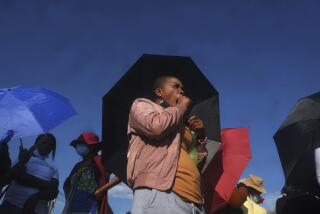Lesotho Hopes to Sell Water to S. Africa
- Share via
LEJONE, Lesotho — After decades of economic dependence on South Africa, the tiny African nation of Lesotho relishes the prospect of selling its only neighbor a resource it urgently needs--water.
Dynamite blasts shake Lesotho’s bleak, treeless highlands where an army of engineers is preparing to dam rivers and tunnel the country’s most precious commodity north to Johannesburg.
Lesotho, smaller than Switzerland and surrounded by the white-ruled republic, could earn millions of dollars a year starting in 1997 in one of the biggest water supply projects ever attempted.
“This is either the largest water supply project in the world or among the largest,” said Hans Pettenburger of the project’s joint permanent technical commission.
“It’s a fantastic project. It shows that there is still some adventure left in the world,” said Gemis Geldenhuys, South Africa’s trade commissioner in Maseru, Lesotho’s capital.
The equivalent of a tanker truck full of water will flow every second to the Johannesburg region when the Lesotho Highlands Water Project’s four reservoirs and 120 miles of underground tunnels are fully developed by the year 2020.
Lesotho is an oasis in semi-arid southern Africa. Its highlands rise to 11,000 feet, one of the few places in Africa where snow falls throughout the year. The area receives abundant annual rainfall of 40 inches.
That water will be needed by the Johannesburg region, where the current 7 million population is expected to rise to 12 million by the end of the century and 16 million by 2010.
The project has cost $220 million over the last four years, just providing roads, power lines, camps and health facilities for some of the 3,000 workers who will blast, tunnel and dig around and under isolated valleys and mountains.
“It’s the most ambitious tunneling system in southern Africa, probably all of Africa, and very ambitious on a world scale,” Pettenburger said.
Italian, French, British, German and South African companies are involved in construction and consulting. Lesotho officials estimate the 30-year project’s total cost at $3 billion at 1987 prices.
The 1.6 million residents of the former British protectorate face an economic crisis because of layoffs in South Africa’s shrinking mining industry, which has been their major employer for a century.
Remittances from migrant workers amount to 40% of Lesotho’s wealth as measured by gross national product.
A future black government in South Africa is expected to give mining jobs to its nationals in preference to foreigners.
“The mining retrenchments are frightening,” said government spokeswoman Mpine Tente.
“But we intend the project to restore some balance to our relations with South Africa in terms of hydropower, jobs on the project, new roads into the previously inaccessible project area, rural electrification and increased irrigation farming.”
Lesotho, which gained independence in 1966, is one of the world’s poorest countries, with annual per capita gross domestic product of about $200.
The project includes an underground hydropower complex that will produce the first electricity generated by Lesotho, currently dependent on Pretoria for power.
Under a 1986 treaty between South Africa and Lesotho, Pretoria must pay for construction of dams and tunnels--the lion’s share of costs. Lesotho pays for the hydroelectric plant.
Pettenburger said financing for the first phase of the project--the first dam, a tunnel to South Africa and a part of the power plant--is expected to be in place by October.
This involves $555 million in offshore finance mainly from European money markets, $1.4 billion in commercial finance in the form of export credits and commercial loans and a $1.1-million World Bank loan.
Officials plan a string of projects to limit the social impact, including compensation for the 460 people moved off land due to construction work. But disease and social unrest may grow as people enter the area seeking jobs, they said.
More to Read
Sign up for Essential California
The most important California stories and recommendations in your inbox every morning.
You may occasionally receive promotional content from the Los Angeles Times.













